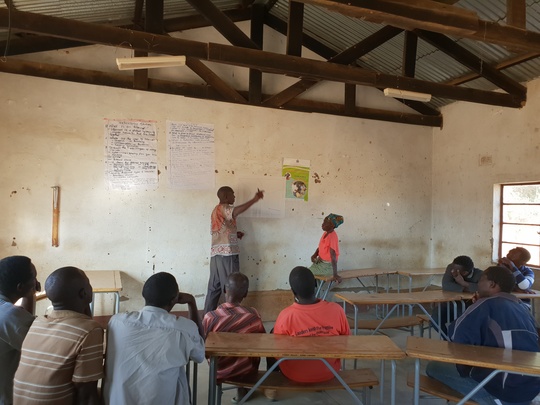Sharing experiences on reconnaissance survey implementation in Zambia
Focus Group discussions during community resource mapping where farmers led discussions and documentation. (Credit: Nansongwa Community of Kazungula district, Zambia)
The Sentinel Zambia reconnaissance survey was implemented from 15 August to 28 September 2019 in the Kazungula, Katete, Kaoma, Kapiri Mposhi and Zambezi districts of Zambia.
The survey’s aim was to understand agricultural expansion and its impacts on natural resources and the environment. I worked in an interdisciplinary research team as an Agriculture and Socio-economic specialist. This article shares my personal experiences and what I learnt during the survey’s implementation.
The research team comprised researchers from different backgrounds including agriculture, social sciences, ecology and natural resources. The basic principle behind the interdisciplinary approach was based on the understanding that rural communities, despite being heavily dependent on agriculture, are affected by almost all sectors of society. This approach involves a holistic diagnosis of key challenges that impact on farmers using the Farming Systems Research approach.
Participatory Rural Appraisal techniques were applied in community engagement and data collection. Key methods used were community meetings, gender-balanced focus group discussions, community resource mapping and transect walks.
Field experiences
The critical entry point for such studies is local village leadership. Once engaged, village leadership becomes key in facilitating research programmes both for the study and follow-up activities.
The practical approach of resource mapping, timelines and transect walks provided a window for active community engagement and participation in the data collection process as well as validation and verification of the situation on the ground. Gender sensitivity in the composition of research participants also played a critical role in ensuring that both male and female farmer perspectives were heard.
Opportunities for networking
Not only interdisciplinary, the study also involved multiple stakeholders who contributed different perspectives in how to address issues of agricultural expansion in the study areas.
The views of different stakeholders (Forestry Department, Ministry of Agriculture, farmer cooperatives, village heads and committees) on issues of agricultural expansion were captured. Stakeholder engagement in data collection opens up opportunities for identifying research gaps as well as interventions that may require follow up by relevant partners.
The reconnaissance survey helped build my capacity for community-based feasibility studies, with community approaches and administration of the Participatory Rural Appraisal techniques emerging as the most critical.
Petan Hamazakaza is a PhD Student at Copperbelt University, Zambia
